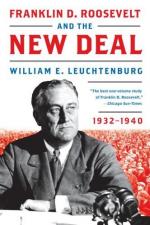
|
| Name: _________________________ | Period: ___________________ |
This test consists of 5 multiple choice questions, 5 short answer questions, and 10 short essay questions.
Multiple Choice Questions
1. When discussing how to justify Roosevelt's war policy to the American people, General Marshall points out that the US has only how many planes available?
(a) 75.
(b) 350.
(c) 102.
(d) 160.
2. Which of the following individuals proposes a federal wages and hours law in May 1937?
(a) Joseph O'Mahoney.
(b) Thurman Arnold.
(c) Walton Hamilton.
(d) Hugo Black.
3. When Japan begins to cause problems in 1939, the US responds by lending how much money to China?
(a) $7 million.
(b) $102 thousand.
(c) $2.5 billion.
(d) $25 million.
4. Which of the following individuals laments in "Stalemate" that Thomas Jefferson would not have spoken to the Democrats?
(a) Harry Byrd.
(b) Carter Glass.
(c) Josiah Bailey.
(d) Maury Maverick.
5. Leuchtenburg states in "The Fascist Challenge" that in September 1938 tension is building in all but which of the following cities?
(a) Bagdad.
(b) Paris.
(c) Rome.
(d) London.
Short Answer Questions
1. In March of 1934 the House of Representatives passes the Trade Agreements Act. By what margin does the bill pass?
2. When Germany makes its move in 1940, how long does it take for the Nazis to drive British troops out of France?
3. After the 1936 farm law proves unworkable, Wallace resists attempts to deregulate production in the hopes of being like which of the following Old Testament characters?
4. When discussing Roosevelt's personality, which of the following individuals is the Under Secretary of State and says the President seems to have multiple personalities?
5. When discussing Roosevelt's personality Leuchtenburg mentions that every part of Roosevelt's life seems to have a public quality, including his dog of what name?
Short Essay Questions
1. Why, in spite of a sticky mid-term election season, did Roosevelt still consider the 1938 elections a success for his administration?
2. Describe the change in American business after the New Deal labor programs, as discussed in Leuchtenburg's review of Roosevelt's presidency.
3. In the early part of 1938, why did Roosevelt seem to prefer allowing the economic gurus to argue around him rather than making any solid decisions about economic policy?
4. What is the soil problem discussed in "The New Deal at High Tide" and how is it resolved?
5. In "A Farewell to Arms," why does Roosevelt find such resistance when he attempts to alert America to the happenings in Germany and other parts of the world?
6. What was the result of the Trade Agreements Act in 1934?
7. Explain the problems with the Fair Labor Standards Act passed in June 1938.
8. What effect does Germany's success in Europe in the spring of 1940 have on Americans?
9. Compare Roosevelt's attitude toward further spending with that of Congress in late 1937, as discussed in "Stalemate."
10. What is the German response when Roosevelt asks Hitler and Mussolini for their pledge in 1939 not to attack thirty-one nations?
|
This section contains 1,259 words (approx. 5 pages at 300 words per page) |

|




